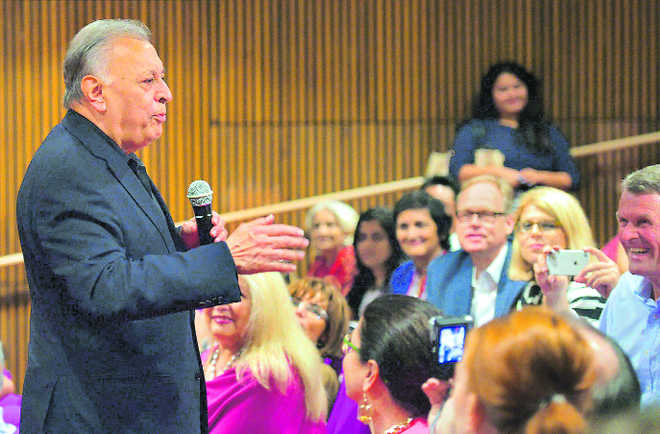Hitting the right notes
Aradhika Sharma
It’s pretty amazing to read about how the biographer, a high-ranking bureaucrat, untrained in music, who had never met the master conductor, Zubin Mehta (except to pose for a fan-photo after a performance by the New York Philharmonic Orchestra in Delhi 1984) and who has authored books of completely disparate genres (The Barons of Banking, Dictionary Of Dates, Jeh: A Life of J.R.D.Tata ) ended up writing a 430-page, fully researched, well-documented book on the maestro. Equally remarkable is how the uninvited biographer managed to get the great conductor to authorise the biography, released to commemorate his 80th birthday, surprisingly soon after his own memoir, The Score of My Life, was published (in English in 2008).
‘I couldn't help thinking that his life had been far more interesting than the understated account given in his own autobiography,’ says the unsolicited biographer Dadabhoy and he proceeded to write a version that he believed would do more justice to the maestro.
Dadabhoy proclaims that he is not versed in Western Classical music. In fact, he says in an interview that when Zubin Mehta asked him “Do you understand music? Do you like it?” He replied: “While I like it, I would be lying if I said that I understood it”. Yet, the author follows the conductor’s musical journey with veracity and sincerity, citing the maestro’s influences, his training and experiments while talking of grand masters, conductors, musicians and symphonies with panache.
Yet, the book has an ease of pace and a layman, unfamiliar with the western classical composers and musicians —Dvorak, Beethoven and Ravel, Johann Strauss Jr, Brahms, Toscanini, Otto Klemperer, Daniel Barenboim — may still follow it with interest as he reads of symphonies and orchestras and great musicians and audiences.
Dadabhoy states his intention of not addressing the personal life of the master in as much detail as following the professional and musical journey of the musical prodigy. Although not too many inputs came from Mehta himself, but there are narrations and recollections of his younger brother, Zarin (executive director of the New York Philharmonic) and his son, Mervon. The author devotes a lot of time to Zubin’s father, Mehli Mehta, (the founder of the Bombay Philharmonic Orchestra, the Bombay String Quartet and later, head of the orchestra department at UCLA) a proficient conductor and musician in his own right and a great influence on the prodigious genius of Zubin.
Yet, the book is not a hagiography and Mehta agreed: ‘but you cannot have a book that has only compliments’. And so we have the account of the huge gaffe that came back to haunt him time and again when he said of the New York Philharmonic Orchestra in 1967: ‘A lot of us think why not send our worst enemy to the New York Philharmonic and finish him off, once and for all.’ Yet, the Bombay-born musical prodigy who appeared on the cover of Time magazine at the age of 31, did stay in New York for 13 years, establishing the longest tenure of any Philharmonic music director in this century. Not just that, he has been music director of the Montreal Symphony (1961-67), the Los Angeles Philharmonic (1962-78), the Israel Philharmonic (1968 to the present) and the New York Philharmonic.
The famous conductor, ‘whose musical legacy remains deeply rooted in the Central European traditions’ is often described as gentle, kind, fair, and generous by conductors, musicians and associates. His boundless energy and insatiable musical inquisitiveness leads him to try new experiments with his symphony orchestra, not all of which have been successful. There was a time, for example, when he tried to explore the link joining the world of the symphony with that of the rockers. At one instance, he and the Los Angeles Philharmonic appeared with rockers like The Who, Jethro Tull, and soul singer Ray Charles. Another time, he collaborated with the American composer, guitarist, singer and director Frank Zappa in May 1970, something he regretted.
There were successful experiments as well, ‘Music from Outer Space: A Star Wars Concert,’ with the Los Angeles Philharmonic at the Hollywood Bowl with the fans screaming in ecstasy. He also led the orchestra in music from the films Star Wars and Close Encounters of the Third Kind. He also collaborated with Ravi Shankar in a fusion experiment which was successful abroad but not so much in India.
The conductor’s genius, his magnetism, his ‘Hollywood’ charisma, flamboyance and his prodigal talent make for a fantastic read. Apart from that, his genuine concern for world peace and his colossal achievement, which makes him one of the ‘upper crust of a rather small loaf’ is vastly inspiring. In the hands of an adept biographer, the life assumes the form of a book that is a significant work.










